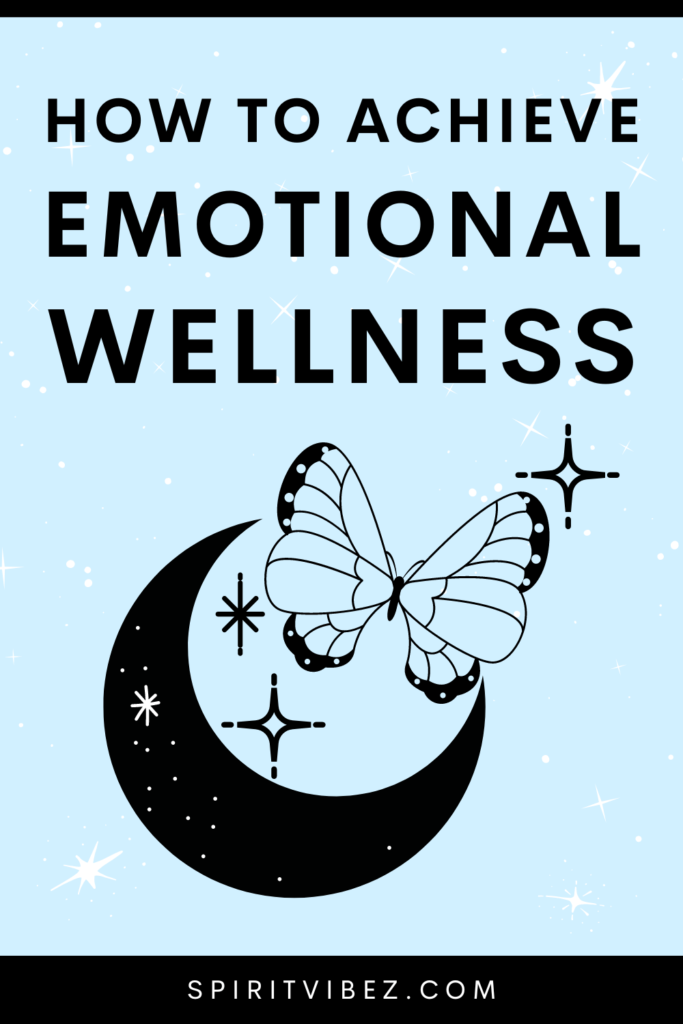Last Updated on January 6, 2023

Work, family, financial challenges, social life, and all other things to keep up with in today’s world can negatively affect your emotional wellness. It’s not easy to be happy and enjoy your life when your emotional health is suffering. While many of life’s ups and downs are out of our control, there are many things we can control.
That includes improving your emotional wellness, and there are many things you can do with minimal time and without spending any money.
In today’s post, you’ll learn what emotional wellness is and why it’s so important. As well as ten powerful ways you can achieve emotional wellness.
What is emotional wellness?
Emotional wellness refers to the ability to understand and manage your emotions healthily. It involves awareness of how your emotions affect your thoughts, behaviors, and decisions. In addition to having a sense of balance and contentment in your life and coping with challenges.
Having good emotional wellness means you can express your emotions healthily and appropriately and regulate your emotions so they don’t interfere with your daily life. It also means having healthy relationships and connecting with others in meaningful ways.
Why is emotional wellness important?
Overall, emotional wellness is an essential aspect of overall health and well-being. It can help you handle challenges and stress more effectively and leads to a sense of satisfaction and happiness.
Emotional wellness is important to help us to better understand and express our emotions, which can lead to greater self-awareness and personal growth.
There are many benefits to achieving optimal emotional wellness. Some of the most significant include:
- Improved mental health: Good emotional health is connected to having good mental health. When we are emotionally well, we are better able to cope with the stress and challenges of life, and we are less likely to experience mental health issues such as anxiety and depression.
- Better physical health: Emotional wellness is also important for physical health. Studies have shown that people with optimal emotional wellness tend to have better overall physical health, and are less likely to experience physical health problems such as heart disease and other chronic conditions.
- Stronger relationships: When we are emotionally well, we can better connect with others and form strong, healthy relationships. We are also better able to communicate effectively with others and healthily resolve conflicts.
- Greater happiness and fulfillment: Emotional wellness is associated with greater happiness and fulfillment. When we can manage our emotions effectively and have a positive outlook on life, we are more likely to feel satisfied and content with our lives.
- Increased resilience: Good emotional health also helps us be more resilient when facing challenges and setbacks. We are better able to bounce back from difficult situations and keep going even when things get tough.
SEE ALSO:
- How to build your emotional resilience
- How to find your true calling
- How to heal yourself emotionally
10 best ways to achieve emotional wellness
Below you’ll find ten powerful ways you can improve your emotional wellness. Try to incorporate all ten strategies into your daily life for optimal emotional health.
1. Move your body more
Your brain and body are connected. You feel your emotions in your body and what you do with your body affects your mind. When you’re physically active, your body is healthier and more attuned to your environment. Sitting for long periods can make you more likely to feel stressed or depressed.
Practice yoga, dance in your bedroom, or simply go for a walk outside. It doesn’t matter what it is just make sure to move your body every day.
2. Be more effective with using your time
The more you can get done, the less left unfinished. Things left unfinished tend to stay in the back of your mind until completed. Finishing your work and household chores regularly will reduce stress and make you more likely to feel calm and relaxed.
Focusing your attention on how to best use your time is a great habit to develop that will benefit you for the rest of your life.
3. Face any financial challenges you have
There are only three basic ways you can deal with your financial challenges: worry about them, ignore them or face them.
Having worries in the back of your head will affect your emotional wellness negatively. Find solutions to your financial problems and start working on them. The other options will only negatively affect your emotional well-being leading to stress and difficulties right now or in the future.
4. Make sure you sleep enough
Getting enough sleep is essential for good mental health and emotional well-being. When you don’t get enough sleep, your brain and body don’t function properly. It can lead to irritability, difficulty in concentration, and a negative outlook, which can all contribute to feelings of anxiety and depression.
Good sleep habits, such as maintaining a consistent sleep schedule and creating a relaxing bedtime routine, can help to improve sleep quality and overall emotional wellness.
5. Be Social
Emotional wellness involves being able to form and maintain healthy relationships with others. That includes being able to communicate effectively, healthily resolve conflicts, and support and care for others.
So even though you enjoy your alone time, you still need to be social regularly. Having someone you can trust can make a big difference.
6. Keep a positive outlook
Emotional wellness involves having a positive outlook and finding joy and meaning in your daily life. That might include setting goals, showing gratitude, and finding ways to engage with the world around you.
Pain mostly comes from unfulfilled expectations. Spend some time each day focusing on being grateful instead of annoying yourself over things you cannot change or not being able to live up to your expectations.
7. Limit watching the news
News stories can often be distressing or disturbing, and watching them can lead to negative emotions such as fear, anxiety, hopelessness, or sadness. Constant exposure to negative news can increase stress levels, which can harm your emotional well-being.
Try to limit the amount of news consumed, choose sources that present information in a balanced and responsible way, and take breaks from watching the news to engage in activities that promote emotional well-being.
8. Try avoiding social media
The basic premise of social media is admirable: stay in touch with friends and family. However, in reality, social media is often used to show off and make other people jealous of their family, car, house, or travels.
Often the image people project is fake and makes others feel small in comparison. Try to avoid social media, and when you use it, do it wisely and mindfully.
9. Limit your commitments
Limiting your commitments can be a helpful strategy for improving emotional wellness by reducing stress and promoting a sense of balance in your life.
A simple and meaningful life is what helps most people thrive. Keep your life simple by avoiding optional commitments that don’t do your life any favors.
Take some time to think about what is most important to you and what you want to focus on in your life. That will help you to prioritize your commitments and say no to things that are not a good fit for you. Also, it is crucial to establish clear boundaries with others about what you are and is not willing to commit to. That may involve saying no to requests for your time or setting limits on your availability.
10. Practice self-care
Self-care is an important aspect of emotional wellness, as it involves taking care of your own physical, emotional, and mental health. That might include getting enough sleep, moving your body, eating a healthy diet, and engaging in activities that bring you joy. Not to mention practicing relaxation techniques such as meditation or deep breathing, and reaching out to friends, family, or a mental health professional if you are struggling with your emotional well-being.
Avoid things that can negatively affect your emotional health. These include the news, social media, unnecessary commitments, and unreasonable expectations. Make sure you take care of yourself, rest enough, stay active, and face life’s challenges that are within your control.
When you’re emotionally healthy, you have a solid foundation to enjoy many other aspects of your life. Make sure you consider all the tips above and decide how you can implement them into your life.
If you enjoyed this post with 10 tips to achieve emotional wellness, I would be very grateful if you shared it on Twitter, Facebook, or Pinterest! Thank you❤️
📌 PIN THIS POST FOR LATER


Hello, my name is Sara and I am the founder of Spiritvibez, I’m here to guide you on your spiritual journey toward healing, growth, and self-discovery. I believe that true transformation occurs when the mind, body, and spirit are aligned and working in harmony. Through Spiritvibez, I hope to inspire and empower you to deepen your spiritual practice, embrace your authentic self, and begin living your best life.
